In this second article of my six state polls series, I look at one of the important swing voters in the coming polls, the Indian community.
Hurtful racialised comments and fielding (and dropping) of Indian candidates raise serious questions about their place in the evolution of national politics, amidst coalitions that are more focused on winning and addressing the majority Malay community and often (disrespectfully) ignoring the serious concerns of minorities.
By focusing on the Indian community, I draw attention to their pivotal political role. In four of the states with coming polls - Kedah, Negeri Sembilan, Penang and Selangor - they will influence not only who wins particular seats, but shape who will hold power and by what majority.
Significant share of voters
The first place to appreciate the central political role that Indians will play in the state polls is in their numbers (and composition of seats).
Indian voters make up a significant minority (over 10 percent) of voters in 66 percent of the seats in Selangor, 56 percent in Negeri Sembilan, 55 percent in Penang and 22 percent in Kedah.
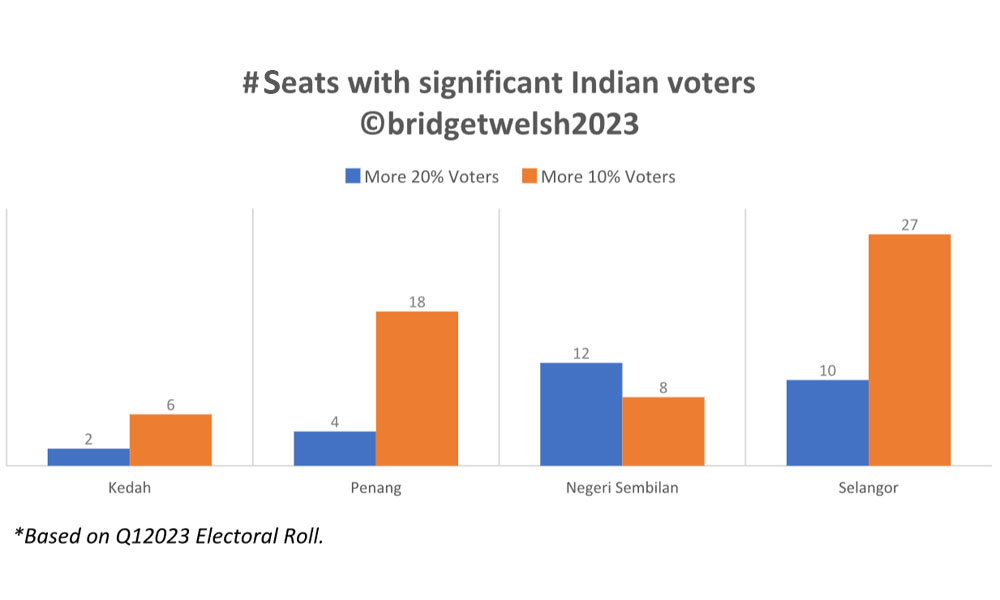
The overall share of Indian voters is 15 percent in Selangor, 14 percent in Negeri Sembilan, 11 percent in Penang and seven percent in Kedah.
Most of the Indian voters are dispersed across urban and semi-urban areas. Yet, there are many areas where they are concentrated, such as in Sentosa in Kota Raja (40 percent of the voters), Perai (35 percent of the votes) on Penang mainland and Negeri Sembilan’s more remote Jeram Padang (34 percent of voters).
The latter seat, which I will return to later, includes Indians living near estates.
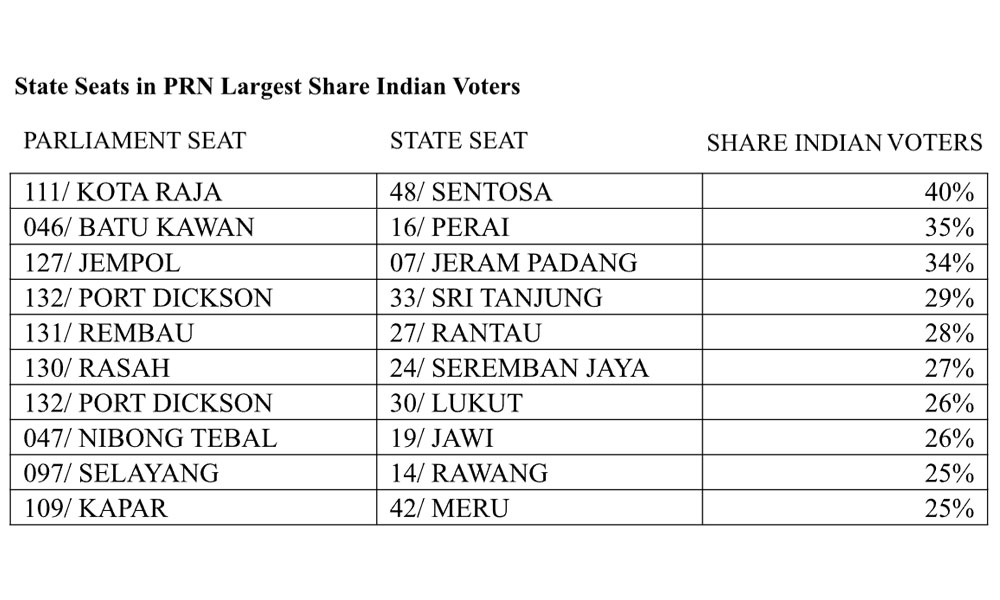
To put these numbers in context, of the four states where Indian voters comprise an important share of the electorate, they hold a significant minority in 52 percent of the seats - more than half!
Even in places like Kota Anggerik, the seat of a PKR incumbent who recently made disparaging remarks (and since responded with an explanation/apology) when PSM announced an Indian candidate for the seat, has eight percent of the voters.
No doubt, Indian voters matter in close races, as do the remarks about the community.
Declining Indian turnout
History shows that Indian voters have mattered in the past; they are an underappreciated electoral swing.
I have argued that the turnout and support patterns of Indian voters were important in the Malacca and Johor state polls and in the 15th general election.
In seats such as Kuala Selangor (which has close races in the coming state polls), without Indian support, Pakatan Harapan would not have won this seat, for example.
For this piece, I analyse data from polling station results of previous state elections 2004-2018, and 2022 parliamentary results to derive estimates of Indian ethnic voting.
As my previous research has highlighted ethnicity is just one factor shaping voting, as other dimensions such as class, gender and region are also important for the Indian community.
Let’s take a look at their turnout in the past in each of the states: Three broad observations:
First, turnout among the Indian community dropped modestly in GE15. This drop was the most pronounced in Kedah, where minority participation has declined overall with increasing PAS dominance.
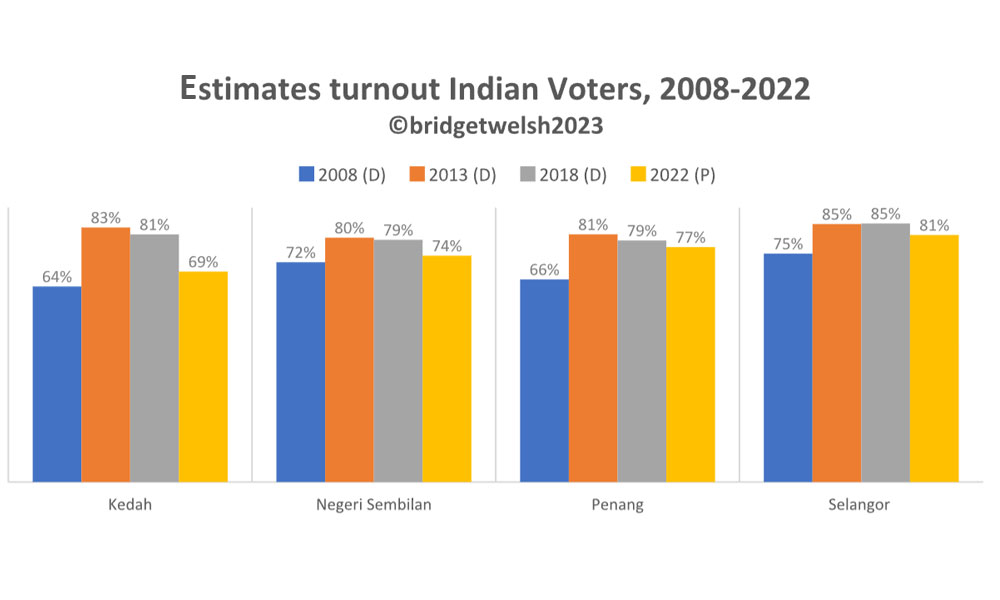
Indian turnout also dropped in Johor (an estimated 38 percent) and Malacca (an estimated 18 percent) polls, pointing to a broader trend of less political engagement with this community.
Given patterns in these previous state elections, Indian voter turnout should not be overlooked.
Pivotal swingers
In contrast to the decline in voting, support levels overall have increased for Harapan, the second broad observation.
This was most evident in Kedah, with an estimated 22 percent, followed by Penang, with an estimated 11 percent increase.
Support levels remained essentially the same in both Negeri Sembilan and Selangor, although in the former support for Harapan dropped by an estimated five percent.
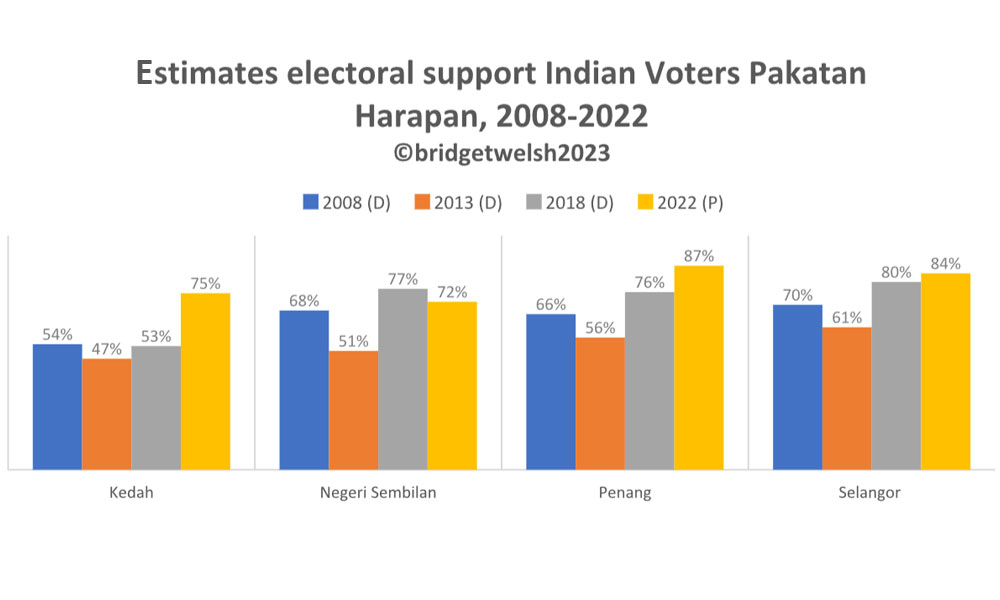
Third, the Indian vote in Malaysia varies. Unlike Chinese voters, PAS/PN has won over a small share of Indian support. Their gains have been most effective among more economically vulnerable Indian voters.
In Penang, for example, PN won an estimated eight percent of Indian voters, followed by Kedah at an estimated six percent.
The remaining share of Indian votes in the four relevant polling states has gone to BN, however.
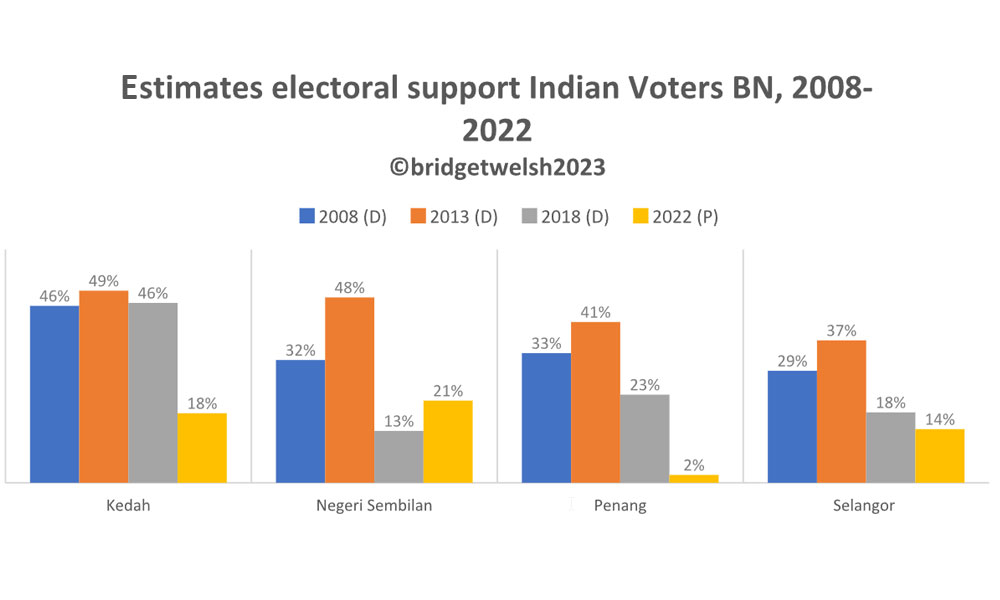
While the share of support from Indian voters to BN has declined overall, it differs across the states involved in the state polls.
Based on GE15 parliament estimates, Indian support for BN collapsed in Penang (estimated 21 percent drop) and Kedah (estimated 28 percent drop). The decline for BN was more modest in Selangor (four percent). In fact, in Negeri Sembilan, BN support increased by (seven percent).
Indians at the unity table
This regional variation in Indian support for the different coalitions highlights that there are multiple drivers shaping Indian voting.
A close look shows that Indian support is tied to a complex set of factors, from nominal representation (slating of Indian candidates) to partisan loyalties and patronage. Indian voters are attuned to whether they are respected and included.
Despite promises, Anwar’s government has yet to introduce any meaningful programmes for the Indian community, as a unique community.
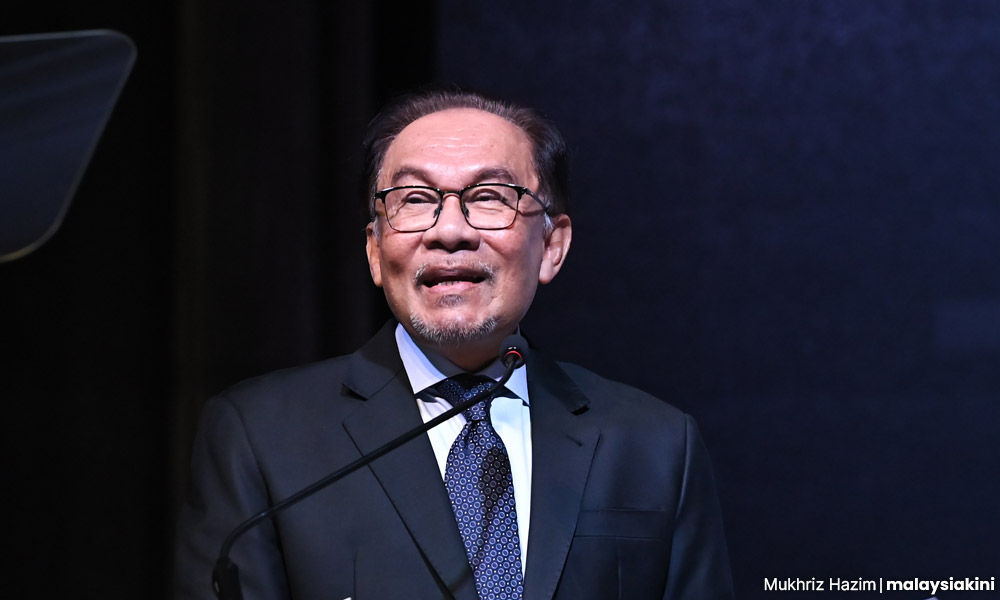
In fact, to date, there has been minimal discussion of the particular problems the community faces - including displacement from estates, protection of religious sites and serious economic vulnerability in families.
The promised programmes to focus on Indian socioeconomic issues in Selangor has yet to be implemented, for example.
Many are looking to see how their concerns are being addressed, with sentiments ranging from hope to disappointment.
From the election fieldwork to date, many Indians express the view that they are being ignored. Among vulnerable Indians (like the rest of Malaysians) rising costs are their main concern.
Where they do appear to be increasingly left out is in politics. There is a sense that Indian candidates are being increasingly displaced.
In Jeram Padang, for example, Umno has apparently taken over the seat from MIC, with the incumbent (or anyone from his party) not even supposedly fielded.
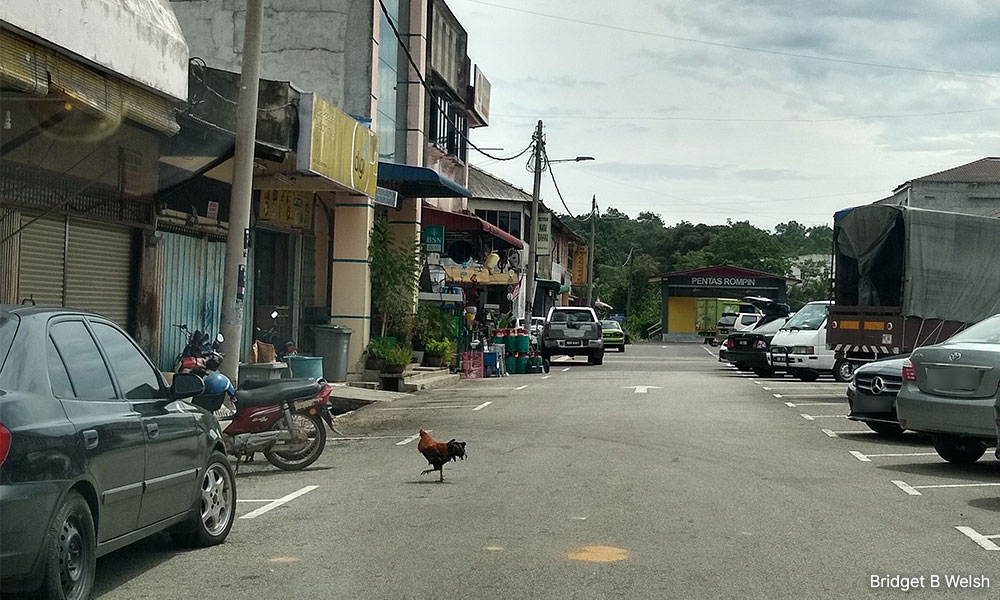
The only seat where one of the BN component parties, MIC, had an incumbent has become wrapped up in national battles within the BN coalition. With local battles ongoing in Umno further compounding candidate selection, Jeram Padang has become a place to settle scores and place allies within Umno.
PN appears ready to slate an Indian candidate to take advantage. This is a seat to watch in coming polls, with Indian voters over a third of the electorate and concerned with displacement.
Similar concerns are being expressed about the dropping of other Indian candidates by other parties, including DAP. The party’s replacement of an Indian candidate in Teluk Intan in GE15 by a Chinese candidate, speaks to the trend of reducing Indian representation across the unity coalitions.
Now, with the six state polls coming, and fewer seats for parties (and even fewer winnable seats), Indian candidates in the unity coalition appear to be getting fewer opportunities, at a time when other parties are stepping up their slating of Indian candidates, including PN, Muda and PSM.
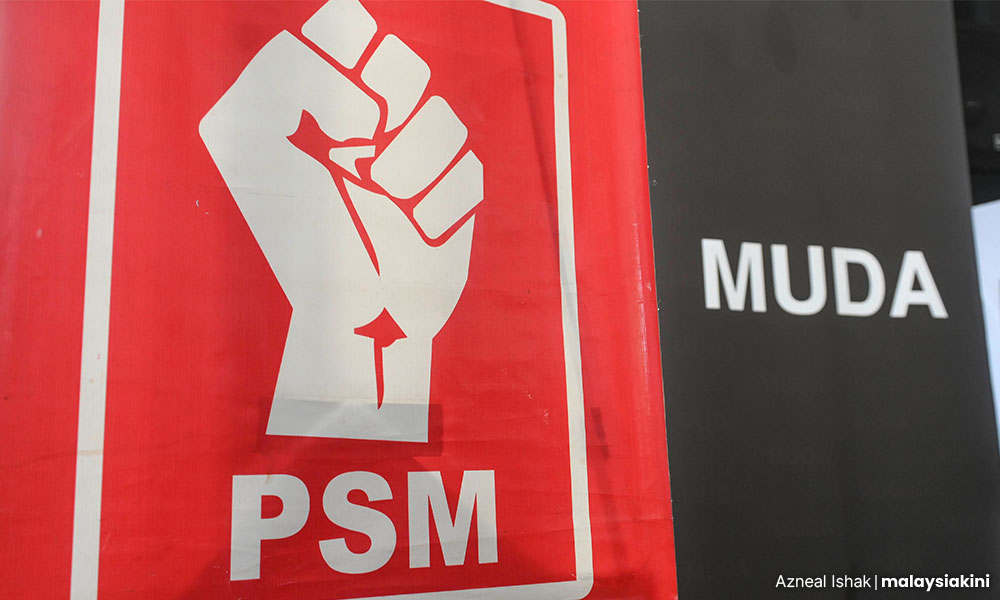
There is still time before the official campaign starts. The candidate lists are still being finalised (even at this late stage), and the campaign is slowly gaining traction.
Whatever happens, Indians turning out and who they will support will matter in the six state polls outcomes.
The hope remains that they will matter more after the campaign than they have mattered so far. - Mkini
BRIDGET WELSH is an honorary research associate of the University of Nottingham, Malaysia’s Asia Research Institute (Unari). She is also a senior research associate at the Hu Fu Centre for East Asia Democratic Studies and a senior associate fellow of The Habibie Centre. Her writings can be found at bridgetwelsh.com.
The views expressed here are those of the author/contributor and do not necessarily represent the views of MMKtT.




No comments:
Post a Comment
Note: Only a member of this blog may post a comment.